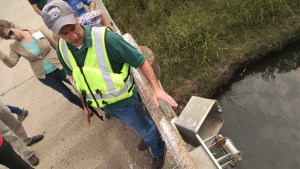The Stream, October 20: China Coastal Wetlands Under Threat
The Global Rundown |
China is quickly losing its coastal wetlands to development, with implications for water supplies and wildlife, a new report found, while environmental groups in England are concerned about the effect of a proposed nuclear power plant on the Blackwater estuary. A toxic algae bloom in the Ohio River should be a wake-up call for municipal water suppliers, managers said. A new wastewater treatment plant opened at Colorado’s Gold King mine site, and the United Nations Children’s Fund appealed for aid to help children in the Philippines who were affected by Typhoon Koppu.
“You need to be ready and have a plan in place. The Ohio River is proof of that.”–Roger Tucker, a scientist at Louisville Water, on the growing threat to municipal water supplies from toxic algae blooms across the United States. (Associated Press)
By The Numbers |
$2.8 million Amount of the United Nations Children’s Fund appeal for children affected by Typhoon Koppu, which has caused flooding and landslides in the Philippines. Agency officials said children are at risk from contaminated water and food shortages. Reuters
$16,000 per week Cost to operate a new water treatment plant at the Gold King mine site in Colorado, where a spill of toxic sludge contaminated the Animas River in August. The Durango Herald
Science, Studies, And Reports |
Approximately 60 percent of China’s natural coastline has been converted by development, imperiling coastal wetlands that are important for freshwater supplies, fisheries, migratory bird habitat, and flood control, according to a report released by researchers in China and the United States. The report found that current government protections for wetlands are not sufficient to keep coastal cities from expanding into wetland areas. The New York Times
On The Radar |
A new nuclear power station planned for a site near England’s Blackwater River estuary could endanger the environment due to the amount of cooling water it would require, according to citizen and environmental groups. The station would replace a defunct nuclear power plant at the same site. Guardian
A news correspondent for Circle of Blue based out of Hawaii. She writes The Stream, Circle of Blue’s daily digest of international water news trends. Her interests include food security, ecology and the Great Lakes.
Contact Codi Kozacek






Leave a Reply
Want to join the discussion?Feel free to contribute!